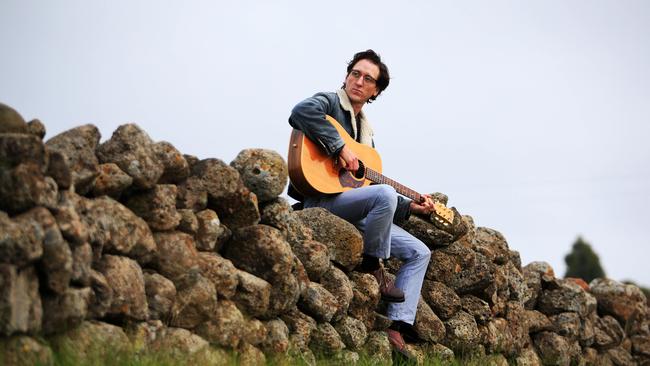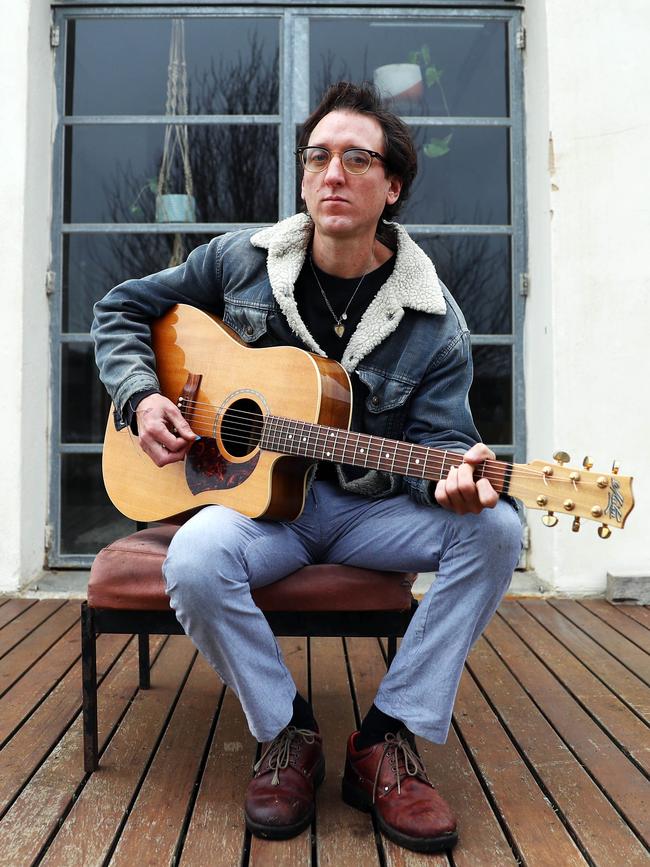Singer-songwriter Jae Laffer on the craft of daydreaming
Seven years after his solo debut, the Panics frontman Jae Laffer returns with The Long Daydream, an album centred on capturing the moment.

The way Jae Laffer sees it, he’s right on the edge of the second phase of his artistic life, and the feeling is intoxicating. Having recently moved to a property 90km northwest of Melbourne with his partner and their eight-year-old daughter, Astrid, the singer-songwriter is cresting a fresh wave of inspiration and momentum that’s tied to an acute sense of belonging: he knows that writing songs is what he’s supposed to be doing with his days.
Looking back, Laffer sees the first phase comprising a steady and acclaimed run of releases as frontman of the Panics, an indie rock band from Perth with strong pop sensibilities that released five albums between 2003 and 2016, including an ARIA Award for 2007’s Cruel Guards and a No 10 polling for its lead single, Don’t Fight It, in Triple J’s Hottest 100. As well, that phase includes the release of his debut solo album, When the Iron Glows Red, in 2013.
A lot has changed in the music business in those seven years between releases: streaming now accounts for about 80 per cent of recorded music revenue for labels and artists, while physical CD and vinyl sales continue to decline with each passing year. Tastes have changed, too, with the singles chart here and abroad tending to be dominated by US and British pop and hip-hop performers. In the lead-up to the release of his second album, The Long Daydream, what hasn’t changed in his time away from recording is his desire to write the sort of music that he wants to hear.
“I feel like such a tourist when I’m listening to the radio, but I really feel like it’s come back on strong for me,” he says. “I mean, there’s such a heavy difference in sound of what’s popular with the younger crew these days than what I grew up with, but I really just have to look at: what do I have to give? What do I want to share with the world? What are my strengths? It’s just about being sincere: what do I got? I know I love words. I love really showing my sensitive side and getting romantic and being quirky, and I just love the simple capturing of the moment.”
For the first time in his career, Laffer wrote and recorded far more songs that ended up on this eight-song album: somewhere between 20 and 30, all up. As well, the making of The Long Daydream saw the songwriter becoming hands-on in a way that he’d never done before: the second single, Some Boys Never Learn, is the first song he’s recorded all on his own, after almost 20 years as a recording artist.
“I’ve crossed a little barrier, because I’ve always been afraid of the technology stuff,” says Laffer, 38. “I’ve always thought, ‘I’m the guy who rocks up with the piece of paper, some words on the napkin — isn’t that romantic? And all the other people, they make records and productions …’ It’s just grown from there. It’s been really empowering. I enjoy this process as well, because I love working in a crew — but I also love moments of solitude where you get lost in the process of creating. That’s where the good stuff comes from, and it’s been quite a big thing for me to be able to step onto the other side and capture those moments myself.”
The album title appears fleetingly in the lyrics of fourth track Passiona: towards the end of the song, whose narrative describes a mysterious man in the suburbs, Laffer sings, “He looks out at the blue of the sky and rattles his keys / Separates life from the long daydream …”
As with Some Boys Never Learn, it’s a song that Laffer largely recorded by himself. In passing, the songwriter gives this thumbnail summary of its origin: “That was about being in Perth when the Claremont serial killer was roaming around, and I drifted off and wrote this song about the feeling in that guy’s bedroom.”

He then moves onto a snapshot of another song, Mettams Pool Melody, which emerged from reflecting on his Polish grandfather’s life story: out of the noise, terror and pain of a Nazi Germany concentration camp, he made it across the world to the relative calm of Perth, where he stood on a silent beach, looking down with wonder at his daughter — Laffer’s mother — who has an Australian accent.
“That’s the kind of stories that are on the record,” he says. “They’re all little pieces of life. And I like that. Isn’t that what an album is? Even if the songs don’t all link, that’s where my brain’s been travelling to over the year that I was putting songs down, and I just took out the most unique ones. I fully understand there’s no radio bangers on the record; I don’t mind. I just know that I feel like songs are worth sharing if they feel like a little part of your personality, and that you feel like it’s honest.”
Passiona is a beautiful and unsettlingly menacing composition built on strummed open chords, a searching bassline and layered vocals. Asked to expand on his brief description, Laffer gives this response, which is worth quoting in full as it offers a brilliant insight into how his mind works.
“I’ve always had this thing from growing up in WA, but I’m sure it’s a global thing,” he begins. “It’s just something that comes with space, and that weather and that silence and the bright light and the sea breeze, but you can’t quite see the sea. I remember I worked for this lady at this little bar when I was 18; I think I was writing about it in my journal. We got talking, and she was going to be another victim of these serial killers the Birnies [David and Catherine Birnie, a couple who raped and murdered four women at their home in 1986]. She managed to escape, and that’s when they got caught. That always stuck with me: this thing that would be happening in the ’burbs, you know?
“And then when the Claremont thing came along [in 1996], I was at Claremont Art School, and it was just around,” he continues.
“It was this thing of, when something evil is going down, no one can put their finger on it, and so it’s just an atmosphere. And that atmosphere is happening in a place that’s visually really beautiful. So places like Perth would get like that: how do you mix that vacation feeling when something is really off and bubbling under the surface?
“And the song is not totally specific, but maybe now I tell you the subject, you go in and it’s [lyrics like] ‘Aerial view of bushland / He kicks back the sheets’ — the kind of thing you’d see on TV. And there’s little lines about ‘Killer in the suburbs / Drives a car / Is polite’. It was just these little fragments that came out of being young and in the city when someone’s out there, and all we know is they probably drive a car, and they are nice to people.
“I guess I soaked up the unique atmosphere of that darkness in a place that is ultimately, on the surface, bubbling with colour and personality and goodwill in general,” says Laffer. “I recognise that feeling as something that’s enjoyable to create, and it’s probably the same reason we love David Lynch films: respecting the beauty of life, but there’s other things always flowing through. I think it’s human to go, ‘Yeah, I recognise that energy’, even if you don’t like to talk about things like ‘recognising energy’; it silences people when you bring it up, because they remember they’re part of a human experience, which is something we spend our lives just trying to work out.”
If that conversational excerpt hasn’t already led you to this conclusion, let’s be explicit: Laffer is a deep thinker who has clearly found his life’s work in the art of songwriting, a form of limitless potential that can never truly be mastered. As any great writer will tell you, the real work — and much of its attendant pleasure, despite the occasional pain of the act itself — is in the regular habit of putting pen to paper, or fingertips to keyboard, in the belief that what comes out today will be better than what came yesterday.
Even the missteps that are never heard by other ears serve their purpose: Laffer compares this process to “cleaning out another shelf in the crazy closet of your mind”. It is telling, too, that he compares the regular act of songwriting to another hands-on trade.
“I just try and respect it as my craft, the same way someone who builds tables and chairs in their shed respects their space, and enjoys it as a kind of ceremony,” he says. “I approach it like that: it’s my passion and my trade, and I want to make sure that I only take things out of the shed that I want people to walk by at market and appreciate.”
The Long Daydream is released on Friday June 19 via EMI Music/LittleBIGMAN Records.


To join the conversation, please log in. Don't have an account? Register
Join the conversation, you are commenting as Logout